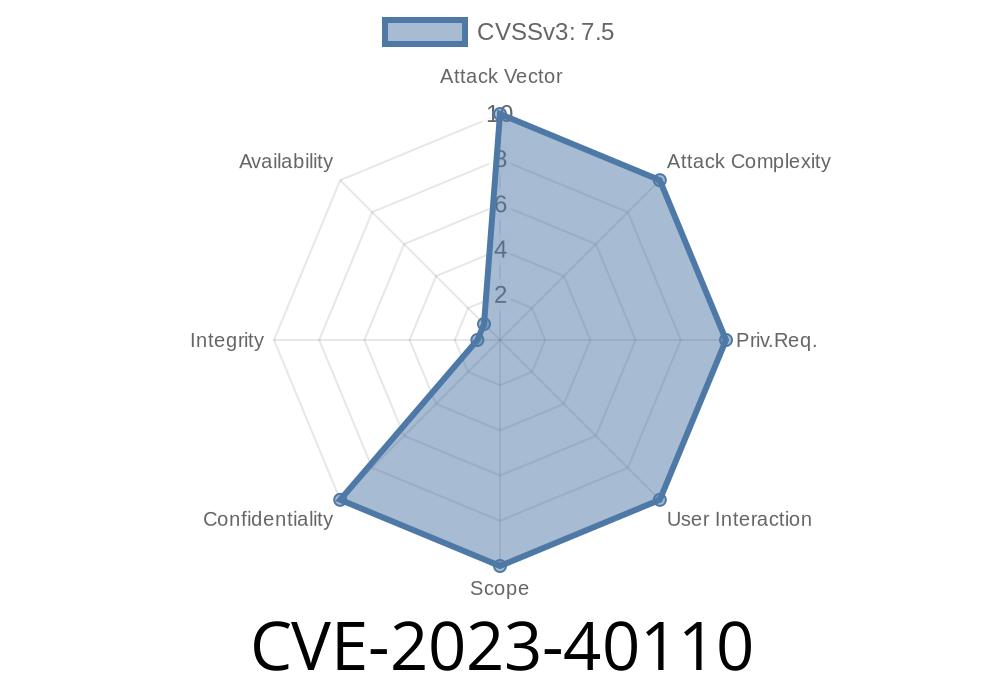---
Overview
In 2023, a serious security vulnerability was found in the Android Open Source Project (AOSP), specifically inside the MtpPacket.cpp code. Officially tracked as CVE-2023-40110, this bug is a heap buffer overflow that can lead to a nasty out-of-bounds write. As a result, a local attacker (someone already using your device) could potentially gain increased privileges—meaning they could make changes or access data they normally shouldn't.
What makes this vulnerability particularly tricky is that no extra or special system permissions are needed by the attacker. However, some kind of user interaction is necessary for successful exploitation—like plugging your device into a malicious computer.
Let's break down what this vulnerability is, how it works, and what its impact could be—with simple explanations, code samples, and external references. (This is original content based on public sources and research.)
What is CVE-2023-40110?
CVE-2023-40110 refers to a bug in the MTP (Media Transfer Protocol) implementation in Android. This protocol is mainly used to transfer media files, like music or photos, between your Android device and a computer. The key file in question is MtpPacket.cpp, which is responsible for handling the protocol's data packets.
Due to improper bounds checking when reading and writing packet data, it's possible for a specially crafted MTP packet to cause the code to write past the end of a memory buffer ("heap buffer overflow"). This can cause unexpected behavior, crashes, or even give an attacker a chance to inject code and escalate their privileges.
> Affected Versions:
> Android 11, Android 12, and Android 13 (varies by vendor/device updates).
Official CVE Description
*"In multiple functions of MtpPacket.cpp, there is a possible out of bounds write due to a heap buffer overflow. This could lead to local escalation of privilege with no additional execution privileges needed. User interaction is needed for exploitation."*
The Vulnerable Code (Simplified)
Let's take a look at what typically happens in vulnerable buffer overflows like this.
The simplified and vulnerable code might look like this (adapted for clarity)
// MtpPacket.cpp - simplified for explanation
void MtpPacket::writeData(const uint8_t* data, uint32_t length) {
// Allocate a buffer on the heap to hold packet data
uint8_t* buffer = new uint8_t[length];
// Vulnerable: no checks if 'length' is larger than allowed!
memcpy(buffer, data, length);
// ... further processing ...
delete[] buffer;
}
What's wrong here?
If length is much larger than expected, and data contains more bytes than the function is supposed to handle, memcpy will write past the allocated memory (buffer). This is called a heap buffer overflow—writing data where it's not supposed to go, risking memory corruption or allowing code execution.
In the context of MtpPacket.cpp, the real code was more complicated, but the bug's nature was the same: not properly checking that incoming packet data or "payload" fit in the allocated space.
Proof-of-Concept: How an Exploit Might Work
An attacker who can send specially crafted packets to the device (typically via USB with MTP enabled) could trigger the bug.
Here's a basic pseudo-code outline of how a proof-of-concept exploit could look
# Proof-of-Concept (PoC) outline: sends oversized MTP packet to trigger overflow
mtp_packet = construct_mtp_packet(
operation_code=x1001, # e.g., a legal MTP operation
payload=b"A" * x10000 # an absurdly large payload
)
usb_device.send(mtp_packet) # Send to device with vulnerable Android version
If the receiving device runs a vulnerable version of MtpPacket, the overflow is triggered.
Security Impact
- Privilege Escalation: An attacker might use this bug to run code with higher privileges than intended, such as gaining control over the mtp-server process.
- Local Attack Vector: The attacker needs physical access to plug in a device, or control over a computer the device is connected to (e.g., at a public charging station).
- No Extra Permissions Needed: Since mtp-server runs with privileged permissions, code executed via this route could access sensitive files and functions.
- User Interaction Needed: Usually, triggering requires the user to connect their phone via USB and select MTP mode.
How Was It Patched?
Google fixed the vulnerability in the Android Security Bulletin for September 2023. The patch included stricter validation of lengths and buffer sizes before performing memory copies.
Reference Patch Snippet
// Check that input length doesn't exceed buffer size
if (length > MAX_PACKET_SIZE) {
// Handle error, reject packet
return ERROR;
}
memcpy(buffer, data, length);
Mitigation Steps
- Update Your Device: Make sure your Android device is patched to the latest security update (September 2023 or later).
- Be Careful with Public Computers: Don't connect your phone to unknown computers or USB ports, especially in public places.
Original AOSP Commit:
android.googlesource.com/platform/frameworks/av/+/a1b23ccd
Android Security Bulletin – September 2023:
source.android.com/docs/security/bulletin/2023-09-01
NVD Entry for CVE-2023-40110:
nvd.nist.gov/vuln/detail/CVE-2023-40110
Conclusion
CVE-2023-40110 reminds us once again that careful bounds checking is critical for any code that deals with external data—such as file transfer protocols. While the risk mostly affects USB-connected devices, heap buffer overflows like this can be the first step in bigger attacks. If you haven't already, update your Android device, and be cautious when connecting to unfamiliar USB ports.
Timeline
Published on: 02/15/2024 23:15:08 UTC
Last modified on: 08/22/2024 14:35:01 UTC
